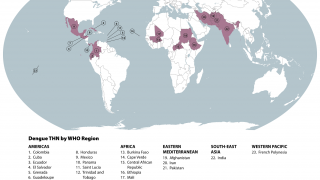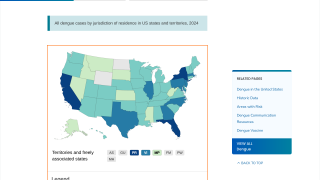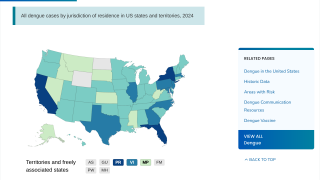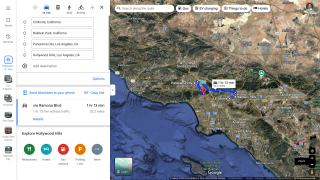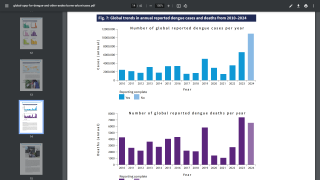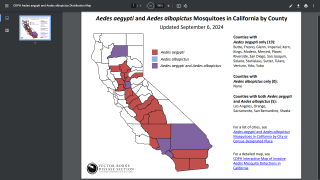Dengue Returned to the USA & Territories During 2019

The states of California and Florida have recently confirmed additional travel-related dengue virus cases during 2019.
And, Florida remains the only state to confirm locally-acquired dengue cases this year.
On December 1, 2019, the California Department of Public Health (CDPH) confirmed there have been 180 travel-related dengue cases this year, with the counties of Los Angeles (42) and Santa Clara (39) confirming the most cases in California.
On the southeast coast of the USA, Florida’s Arbovirus Surveillance Week #50 reported 374 travel-associated dengue cases, as of December 14, 2019,
The south Florida counties of Miami-Dade County (218) and Broward (44) have reported the most dengue cases during 2019.
This new report confirms Cuba (234) is the leading destination of where travelers visited, contracted, and then returned to the USA infected with the dengue virus. The Caribbean countries of the Dominican Republic (26) and Jamacia (25) cases are ranked #2 and #3, respectively in 2019.
This new information is important since Florida’s various international airports are gateways to the Caribbean and Central and South America, where over 2.3 million dengue cases have been reported by the Pan American Health Organization during 2019.
Furthermore, so far in 2019, there have been 14 cases of locally-acquired dengue fever cases in Florida, which have been reported by the Broward, Hillsboro, and Miami-Dade (12) counties.
In total, the US Centers for Disease Control and Prevention (CDC) has confirmed 1,026 dengue cases in the USA, and an additional 46 in the US Territories, as of December 6, 2019.
Similar to Florida, Puerto Rico has reported both travel-related cases (6) and locally-acquired (19) dengue cases this year.
In the USA, an infected mosquito (Ae. aegypti or Ae. albopictus) can spread the dengue virus to people through bites. Additionally, sexual relations may also spread the dengue virus between humans.
On November 18, 2019, Spanish authorities reported the likely sexual transmission of the dengue virus between two men. According to the Spanish authorities, the comorbidities of both patients were assessed by clinicians responsible for their follow-up.
The European Centers for Disease Control (ECDC) report said 1 of these men had traveled to dengue-endemic countries of Cuba and the Dominican Republic, and then returned to Spain on September 4th. His partner then developed dengue symptoms on September 15th.
‘Based on the currently limited evidence, sexual transmission of dengue appears to be a rare route of transmission and the risk, is considered extremely low,’ said the ECDC in its November report.
The dengue virus has 4 subtypes.
Most people infected with dengue have mild or no symptoms. Those that do develop symptoms recover after about 1 week.
Infection with one subtype doesn’t protect against infection with the others. In fact, the risk of developing severe dengue is highest during a person’s second dengue infection.
Severe dengue can occur, resulting in shock, internal bleeding, and even death.
There is no specific treatment for dengue, but early detection and access to proper medical care lowers fatality rates to below 1 percent, says the US Centers for Disease Control and Prevention (CDC).
> Dengue Testing at UltaLabs <
In the Americas, dengue outbreaks have evolved from few low-level endemics to pandemic situations in Central American countries during 2019.
To alert international travelers of their potential dengue risks, the CDC issued a Level 1 Travel Alert on December 4, 2019, which said ‘there is an ongoing risk in many parts of Central and South America, Mexico, and the Caribbean.
Furthermore, the CDC updated its website during October 2019, saying ‘If possible, avoid travel to areas with risk of dengue during pregnancy.’
‘Pregnant woman already infected with dengue can pass the virus to her fetus during pregnancy or around the time of birth. And, dengue can have harmful effects on an unborn child, including low birth weight and premature birth.
The CDC says to see your healthcare provider if you live in or have recently traveled to an area with dengue and have a fever and rash, aches, and pains.
Regarding preventive vaccines, Dengvaxia is the only approved dengue vaccine in the USA and about 20 other countries.
Dengue vaccine candidates in clinical studies include Takeda TAK-003, Merck V180, Butantan Institute TV003/TV005, and Emergex DV1-DV4 vaccine candidate.
Dengue vaccine news is published by Precision Vaccinations.
Our Trust Standards: Medical Advisory Committee



